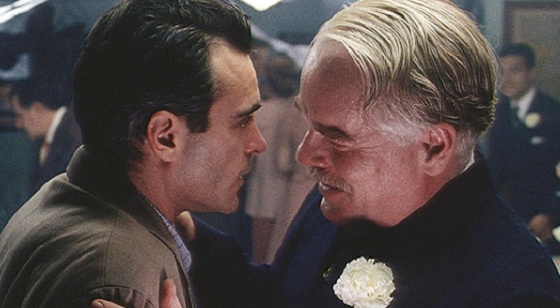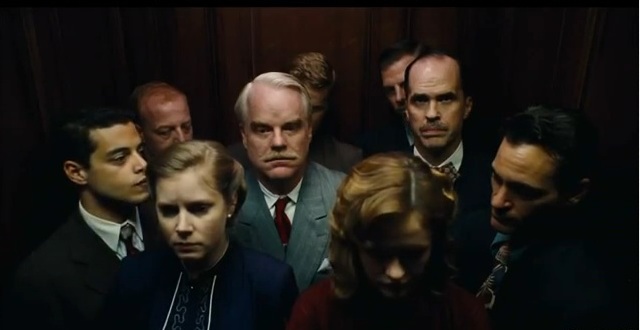PT Anderson has created what is, in some ways, the inverse
of one of the greatest movies ever made.
His last film was There Will Be Blood, and, like The Master,
it deals with the drama in a single relationship. The central relationship also has a
charismatic, skilled leader, used to directing and controlling situations with
his charisma, and a weak, almost pathetic individual who is trying to succeed
and finds he is unable to achieve his goals.
In both films, the relationship changes each of the men, directing their
future in a way that would unforeseeable.
In the film There Will Be Blood, the central relationship is
an enmity that increases envy, greed, power plays and violence. In The Master, the central relationship is a
friendship that increases each man’s ability to function in the world.
Joaquin Phoenix plays Freddy, a sea man who was in the navy
and worked other vessels after that. He is sexually deviant, but we later discover
that he doesn’t just take opportunities for sex—what he really wants is
relationship but he cannot control his desires or anger. Due to his drunkenness, he loses many jobs
and then stows away on a ship borrowed by Lancaster Dodd, the head of a new
mystical cult.
Lancaster is also in a bit of a bind. He is in financial difficulties, and his wife
says that he finds himself obsessed with his enemies who attack him and his
methods. When the clearly drunk,
hopeless, pathetic Freddy comes on board, they have an immediate attraction for
each other. They truly enjoy each other’s
company and appreciate each other in a way that others’ do not. Freddy has never had anyone who accepted him,
but also wanted him to grow. Lancaster
was inspired by Freddy, seeing him as a pallet to create new theories and to
inspire new ways of healing the weak.
Paul Thomas Anderson is a great director. He knows how to pull in varying elements to
make a fascinating, cohesive whole. His
writing has gotten much better over the years and he pulls in some remarkable
talents in cinematography and music. But his most remarkable gift is that of
pulling out some of the best performances by very talented actors. In years past, he directed Burt Lancaster and
Tom Cruise into possibly their best performances. There Will Be Blood has arguably the best
performance by one of the best actors on screen, Daniel Day Lewis. In The Master, Joaquin Phoenix certainly
gives his best performance on screen, and Amy Adams, Phillip Seymour Hoffman
and others give their strongest, most memorable characters. Whether one appreciates PTA’s stories or
conclusions, his films are requirements to be seen for the performances.
Although I’ve heard otherwise, I think that The Master is
one of Anderson’s best films, second only to There Will Be Blood. It stands as a great film about relationship
and deep human connection. It has some
of the best performances you will see this year. It is a remarkable work and will not get the
praise it deserves. 4.5/5
***
(Spoilers below)
(Spoilers below)
It would be easy to focus on the cult, called The Cause, in
this film. When you hear about the
studies of Scientology and L. Ron Hubbard PTA did to work on this film, we
might think, as the rumors have said, that this would be a film about
Scientology. But The Cause isn’t the
central player, and how the cult grew and expanded isn’t the focus of the
film. This is only tangentially about a
cult or religion. It is instead about
human connection.
Everything that happens is about the central relationship
between Freddy and Lancaster. And all the side stories are about where the two
men came from and how this one central relationship shaped their lives. Freddy wasn’t, we find, completely
pathetic. He was in line to marry a
young beauty in his home town. But he
needed work to establish himself financially, so he took on a position on a
boat that took him far from home for many years. And that proved to be too much for him,
causing him to despair about his life and to drink severely. In the end, what Freddy really wanted was not
alcohol or sex, but a deep, lasting relationship, and he felt that he had lost
his opportunity.
Lancaster had a successful cult, but it was limited in scope
and easily mocked. He wanted not just to
help old women discover new things about themselves, he wanted to find out how
to improve the human condition, to heal and to teach others how to heal. His relationship with Freddy helped him achieve
these goals. He was able to gently
experiment on Freddy, using what relational powers he had to bring Freddy to a
new level. In the end, he felt that he
had learned much, even if Freddy never accepted the teachings of Lancaster, and
his findings were posted in a new book.
Freddy didn’t learn about methods to make him successful, and
he was never truly accepted by the cult, the way he was by Lancaster. Despite his relationship with Lancaster,
Freddy continued to be a drunk and despite Lancaster’s protests, Freddy
continued to have violent rages. But
Freddy picked up on what he needed in life from Lancaster’s friendship that he
couldn’t find in Lancaster’s teaching.
He learned about loyalty, about faithfulness, about connecting with
others, about self-discipline, about taking joy in others. Finally, he was able to take what he learned
and face the world.
Although his relationship with Doris, his intended, was long
past recovery, he could use his new social skills to meet new people, and to
find a deeper level with a woman than just sex.
He went into life ready to relate, ready, for the first time in his
life, to really love.
Only relationship can train us to relate. Joy in friendship helps us to find the
wonderful things that others have to provide.
The discipline of keeping friendship helps us to be disciplined in other
areas. Only love can teach us how to
love. And to find that relationship of
love is almost happenstance, and it is certainly odd. Love makes for strange bedfellows, both
literally and figuratively. A cult
leader and a drunken sailor best friends?
What do they have in common? In a
friendship, what we have in common is our mutual need for each other. Maybe this need isn’t a deeper relationship,
maybe the need is more course. But that
need is what initiates, and sometimes drives, the love. But that need causes us to grow and to
deepen, to become richer human beings in ways we never would have seen.
Every intimate relationship, in its own way, makes us a new
person. And even when the relationship
ends, whether for good or for ill, we can look back and say, “If it were not
for this person, I would not be who I am today.”







Steve, I am amazed you can do a review that is so detailed and thoughtful without having the DVD in hand for multiple viewings.
ReplyDeleteThe key is: write the review (or at least notes) right after watching the film. If it's a film I'm not that interested in, I can't remember (or try to forget) the details. But with a Master-ful movie like this, it's easy to remember the details.
ReplyDelete